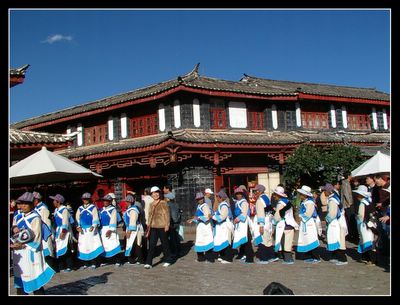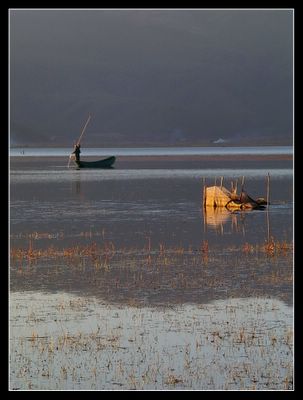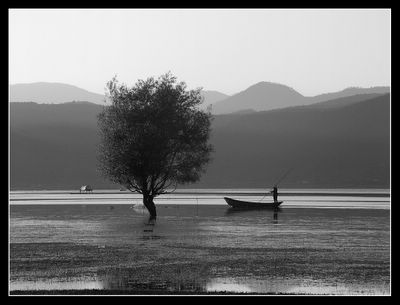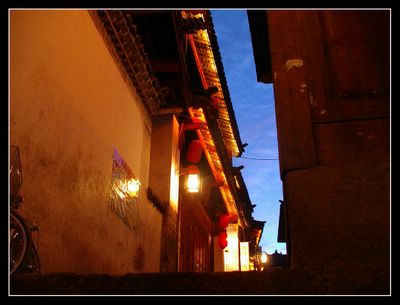农家乐
I arrived in Lijiang right after the corn harvest. Before the arrival of the tourism business here, the locals made a living by farming. In this picture, the local people dried corn and hung them with red lanterns under the eaves. Red and yellow in front of a blue sky -- they are very nice colors in the daylight!

Naxi is a minority tribe in China, mainly located in the Lijiang area. The Naxi people have their own language and they have a different writing system using the Dongba characters. It is a kind of pictograph and it is in the list of World's Relics by the World Cultural Heritage Commission of the UNESCO (United Nations Educational, Scientific, and Cultural Organization). Dongba, in the Naxi language, means intellectual people. They have a very high social status in the Naxi tribe. The position of Dongba is inherited from the previous generations and only prosperous males can inherit it. Currently, there are less than 20 Dongbas left and they are the only people who can still read and write Dongba characters. Nowadays, the Naxi people are deeply influenced by the greater Chinese culture. In fact, many Naxi kids can only speak Mandarin and the Naxi language is quickly disappearing. It's interesting that the Naxi language doesn’t sound like Chinese at all, it sounds more like Japanese. I learned a few words there, but unfortunately, I don’t remember much now except for one dirty word, which sounds quite like “Thank You” in Japanese. It’s funny that no matter if you are a girl or a boy, you can always learn dirty words faster.
In the Naxi language, a young lady is called “Fat Sister Gold”. This is because Lijiang is on a plateau where the air is thin and the women use lots of energy to do their labor in the fields, so they tend to be very slim. Young Naxi girls consider plumpness as beauty, so they feel happy if people tell them that they are fat. When I first arrived in Lijiang, I knew nothing about the Naxi culture, so I always called the local waitress “Miss, Miss”. Later, I was told not to call the young lady by that name -- it has a bad meaning there. But I often got laughed at when I call them “Fat Sister Gold”, probably because I didn’t get the accent right. Interestingly enough, I found out that I got much better service when I called them “Fat Sister Gold” instead of “Miss”.
The center area in old town is called Square Street where people get together and socialize. On weekends or holiday nights, people will light a fire in the middle of the square and dance around it. The fire party also serves another purpose: it allows young people to meet each other. The Naxi women’s traditional clothing is pretty, but practical. It has a very romantic name – “Pi Xing Dai Yue”, which means wearing stars and moon. Their outfit includes a thick scarf and a hat. There are some patterns on the scarf that looks like the feather of the peacock, which symbolizes the stars. The hat symbolizes the Moon. Even the name of their clothing has a practical meaning. Since Naxi is a traditional Chinese tribe, before liberation, the women had to do all the labor while men studied painting, music or hunting. The women had to go to the field and farm before sunrise and then return home after sunset. They needed to lower their head and watch the ground while working in the field, so they were not able to see the sun during the day. All they could see were the stars and moon on the way to and from work. Also, the temperature changes dramatically from morning to night, so the scarves kept them warm and protected their backs when carrying heavy baskets. I’d say that the liberation movement did a very good job of freeing Naxi women from heavy labor.
Dancing -- Naxi women dancing on Square Street

丽江是少数民族地区,主要的民族是纳西族。纳西族有着自己传统的文字--东巴文,也是遗留下来为数不多的象形文字之一,被列为世界保留遗产。东巴在纳西语中得意思是知识分子,由于他们知书答理,在纳西族的地位很高。东巴是世袭相传的,而且传男不传女,目前整个纳西族只有不到20个东巴了,而他们也是唯一现有还会写东巴文的人。现今的纳西人汉化十分厉害,很多纳西小孩已经只会说普通话,纳西族语也逐渐在遗失。说起纳西语,有趣的是它听上去一点儿也不像中文,倒是十分像日文。我倒是兴冲冲学了几句,可惜都不记得了,唯一还有印象的是一句骂人话,讲起来很像日语中的谢谢。想来可笑,不分男女,脏话总是给人更深印象。纳西人管年轻女子称作“胖金妹” ,谐音为“潘金妹” ,这可和“潘金莲” 毫无关系。因为丽江地处高原,氧气不够充分,日常劳作相对耗体力大许多,所以女孩子的体型都偏瘦,而旧时纳西女子以胖为美,所以喜欢别人叫她们胖,这也是“胖金妹” 的由来。刚到丽江时,不知道他们的习俗,去饭馆还是“小姐,小姐” 的乱叫。后来被在当地雇的纳西族司机骂,不可以随便叫纳西姑娘“小姐” 。好在旅游景点汉化厉害,叫了也没有什么大害。倒是在叫“胖金妹” 时常发觉被偷笑,估计是口音不正的关系,不过得到的服务态度都较叫“小姐”时要亲切许多。
古城的中心地段叫四方街,是古时群众聚会的场所。逢周末或节假日的晚上有沟火晚会,是当地男女青年社交的地方。纳西妇女的传统服装漂亮又实用,而且有一个很特别的名字--“披星戴月” 。星指的是她们的披肩,上面袖着类似孔雀羽翎的图案,象征着星;而月则指她们头上带着的帽子。除了服装的样式,“披星戴月” 还有另一层含义。纳西是一个十分传统的民族,因此妇女们需要干很繁重的农活,而男子则以琴棋书画以及养鹰打猎为乐。妇女们每日天不亮就要下地干活,只到天黑回家,这也是披星戴月” 的另一层含义了。因为丽江早晚温差很大,披肩起到保暖的作用,而妇女们在干农活是,会将背篓背在身后,披肩也起了保护作用。虽然很是佩服纳西妇女的吃苦耐劳,但想想还是觉得新社会好啊,男女半边天。
A Naxi (纳西 -- pronounced "nah chi") old lady selling her hand-made belts and socks.
 >>next
>>next














